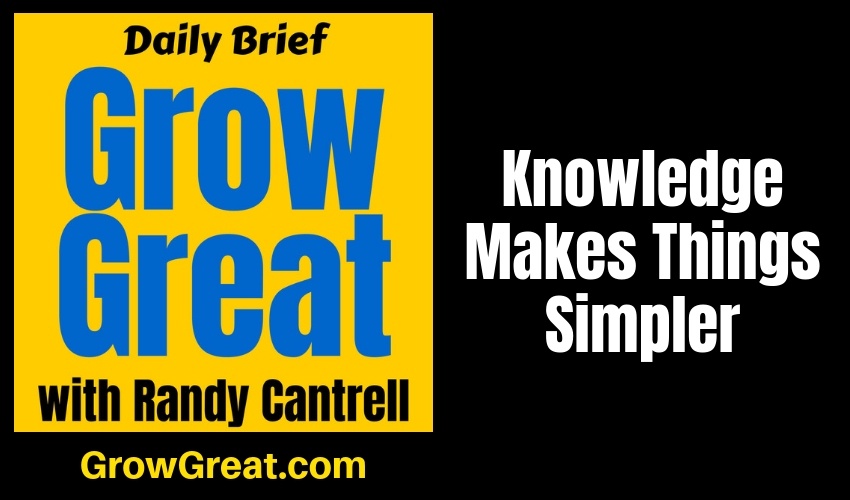Podcast: Play in new window | Download (Duration: 9:04 — 8.8MB)
Subscribe: Apple Podcasts | Spotify | RSS | More
By now you’ve certainly figured out that leadership and entrepreneurial success rely on LEARNING. Achievement, accomplishment and success don’t happen immediately. They take time. Largely because we have to figure out what works. That means we spend time doing things that don’t work. No way to know until you try.
As we push forward to figure things out our learning increases. Knowledge piles up. And with it, we’re able to distill things down into a more clear picture. We see what won’t work, and we often see why. We find out what does work, and if we’re fortunate, we’re able to figure out why so we can replicate it. Otherwise, we just roll with it and embrace gratitude that good fortune smiled on us.
Knowledge can simply things because the more we know the more we’re able to distinguish between the essential and non-essential. Knowledge enables us to start eliminating things. It also gives us the power to become more efficient and effective.
“It is not a daily increase, but a daily decrease. Hack away at the inessentials.” – Bruce Lee
Your flashlight dies. You open it up and pop out the batteries, then you slide in a pair of new ones. You put the flashlight back together, but it won’t turn on. You open it back up, pop out the batteries and turn them around. Presto! Now the flashlight works. The batteries have a positive side and a negative side. They’re simple. And easy. But knowing which way they go makes it simpler. Put them in wrong, the flashlight won’t work at all. Put them in correctly and it’s as bright as it ever was.
Failure. Success.
Sometimes the line between the two is thin. Just another big reason why you need to be committed to learning. It makes everything simpler. It works!
Let’s talk about some practical applications for you and your business.
Hack away at the cumbersome.
Look inside your business for processes that are cumbersome. We’ve all got things that are more difficult than they need to be. We instinctively know it. But sometimes we ignore it. Maybe we don’t want to take the time to wrestle with it right now. Whatever the excuse, jettison it. Take the time to hack it apart. It’s time.
A common area where cumbersome exists is in an extra step. Or more than one extra step.
Speed it key. Extra steps slow things down. Slow is cumbersome. Speed is lean.
Identify and eliminate the cumbersome. All of it. Rally the troops to help you. They will happily engage in helping you because these bottlenecks impact their lives every single day.
One battle cry that I’m fond of – and one I’ve used for years inside companies I’ve run is to challenge the team to make the company…
highly maneuverable
Cumbersome is the enemy of highly maneuverable. You won’t get any resistance from the people most negatively impacted by cumbersome processes.
Don’t make customers pay the price for simpler.
Know what customers want and need. Knowledge makes things simpler. Unfortunately, sometimes companies get into protection mode and make things more difficult because they’re afraid of being taken advantage of. Why should customers pay the price for your inability to make things simpler, or for your paranoia that somebody may take unfair advantage of you.
Some fast food restaurants don’t make napkins readily available. They give you a certain number of them with your order. Need more? You’ll have to ask. There are none to be had out in the restaurant.
What do you wanna bet that some brainiac at corporate figured out how much money could be saved by eliminating the ready availability of napkins to the customers? That’s making the customer pay the price. It’s ridiculous.
Simpler should benefit the customer and the company. If it doesn’t benefit both, question it. Something is wrong.
Simpler creates happier employees.
Not because they lack intelligence, but because they have intelligence. Simpler makes more sense. It’s less insulting. And the speed makes people happier.
Somebody says, “Yeah, but we simplified a process and it eliminated a job. That person wasn’t happy.”
Make them happy. Find them another job. If they’re not worth keeping, it’s not the simplification that’s the problem. It’s that you allowed the complexity to disguise their ineptness. If the employee is valuable, then they can provide value in a new spot and you can likely make them happier in the process. Try it.
A chief frustration of employees is that nobody is paying close enough attention to the work they’re doing. And nobody knows what is broken. Where things are painful because the systems, workflows and processes are so broken.
This pursuit fixes that. Employees quickly see that leadership is actually devoted to doing things to help them do their work better.
You can’t do it if you don’t know about it though. So stop putting the batteries in backward. Learn which way the positive end should go and it’ll change everything by making things simpler. It’ll help things in your company work better, faster and more profitably.
Be well. Do good. Grow great!

 About the hosts: Randy Cantrell brings over 4 decades of experience as a business leader and organization builder. Lisa Norris brings almost 3 decades of experience in HR and all things "people." Their shared passion for leadership and developing high-performing cultures provoked them to focus the Grow Great podcast on city government leadership.
About the hosts: Randy Cantrell brings over 4 decades of experience as a business leader and organization builder. Lisa Norris brings almost 3 decades of experience in HR and all things "people." Their shared passion for leadership and developing high-performing cultures provoked them to focus the Grow Great podcast on city government leadership.
The work is about achieving unprecedented success through accelerated learning in helping leaders and executives "figure it out."
